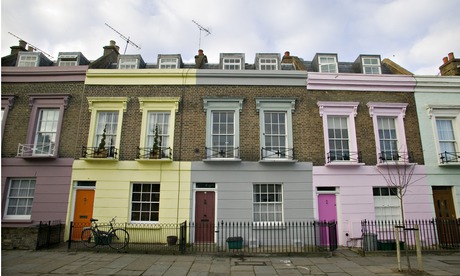The housing market is broken. But in Camden we are starting to fix it
08-07-2014
The Conservatives have done practically nothing to ease the crisis. For the sake of our cities it is imperative we act

Sarah Hayward
Houses in Camden

A row of homes in Camden, north London, where the average cost of a house is now £700,000. Photograph: Frank Baron for the Guardian
Britain faces a housing crisis. For a long time, people on low incomes have been struggling with the cost and quality of housing. But itís now so acute that, in my role as leader of Camden council, even senior people in multinationals raise with me on a regular basis the issue of housing for their staff.
Camdenís housing market is one of the most extreme in the country. The average cost of a house is £700,000. This would require a household income of about £175,000 to get a mortgage. Average weekly rent for a two-bed flat is £440, requiring an annual income of about £70,000. Even Boris Johnsonís so-called affordable rents, at 80% of the market rate, need an income of £50,000. Average earnings in Camden are £33,000. Something has to give.
The Conservatives have done practically nothing to ease the crisis. House building is only just starting to pick up again, while the Help to Buy scheme has fuelled price increases and created a housing bubble that puts our fragile recovery at risk.
The housing market is broken for a few reasons, but the main one is the market itself. House builders Ė private companies in the main Ė benefit from spiralling values. One way to keep prices rising is to restrict supply. This started under Thatcher with right-to-buy. She stopped councils building replacement homes for the ones that were sold off, with the idea that the private market would step in. It didnít. She let existing stock slide into disrepair. When Labour came to power in 1997 the focus was investment in existing stock and only latterly on building. But crucially, and fatally, Labour didnít reverse Thatcherís ban on councils building until 2009.
Like all complex problems, there isnít a single solution. But in Camden have a few ideas.
Weíre building a lot of housing. Last year, one in 20 council houses built nationwide was being built in Camden. But weíre restricted by a cap on the amount we can borrow. Our council housing stock is worth more than £2bn, but weíre only allowed to borrow a quarter of that to build more. A recent bid to borrow a mere 5% extra was turned down. We could build much more housing if we could borrow a little more.
When land values are high, and rising fast, building isnít the only problem. The annual inflation on land values, especially if it has planning permission, means there is no need for developers to build anything in order to make a nice profit. A land banking tax would encourage them to build.
Once homes are built they need to be occupied. This may seem obvious. But again, the dizzying growth of property prices in London means it can be less hassle to keep a home empty and bank the guaranteed gain when you sell it on in a year. In Camden, we charge additional council tax on empty homes and this has already brought more than 100 homes back in to use, many in the private rental sector. But 150% of the usual council tax is the maximum we can charge Ė a higher levy would have greater impact.
In Camden, a third of people live in private rented homes, which can be unstable, of poor quality and often very expensive. People who live in this sector arenít only young professionals and students, but families too. No security of tenure means landlords can act almost at will to increase rents or evict tenants. Every move involves unregulated agency fees and deposits. A number of things would help. These include longer tenancies, stabilising rents with either a cap or at least consistent increases to help tenants manage costs, and cracking down on letting agency fees.
Camden council is exploring different rent models with the London School of Economics. We run the London Landlords Accreditation Scheme and are looking to introduce licensing for the worst landlords, as Newham and some other councils have done, which would allow us to take tough enforcement action, ban rogue landlords and even take over management of the properties. Better regulation of this sector would help millions of people whose housing is most at risk.
Finally, we need to ensure that we preserve a mix in our communities. Cities are living, breathing organisms. London, and our other great cities such as Manchester, Birmingham, Hull, Newcastle and Glasgow, all rely on diversity, including economic diversity, to keep them great. If these cities become unaffordable to a whole section of society then the local economy, services, culture and community suffer. Itís an economic imperative as well as a social imperative to crack our housing crisis.
A Labour government from 2015 must deliver its commitment to build 200,000 homes a year, because thatís the only way we will be able to provide good-quality affordable homes where they are most needed. We must have people in government with the experience Ė and the political commitment Ė to drive through changes to the housing market.

